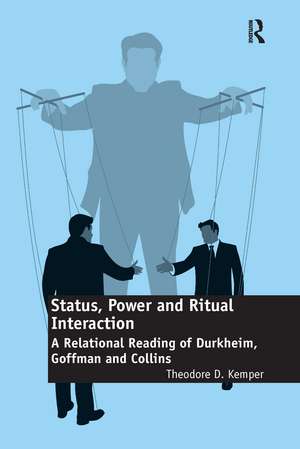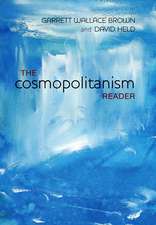Status, Power and Ritual Interaction: A Relational Reading of Durkheim, Goffman and Collins
Autor Theodore D. Kemperen Limba Engleză Paperback – 30 iun 2020
| Toate formatele și edițiile | Preț | Express |
|---|---|---|
| Paperback (1) | 259.98 lei 6-8 săpt. | |
| Taylor & Francis – 30 iun 2020 | 259.98 lei 6-8 săpt. | |
| Hardback (1) | 820.73 lei 6-8 săpt. | |
| Taylor & Francis – 28 aug 2011 | 820.73 lei 6-8 săpt. |
Preț: 259.98 lei
Preț vechi: 311.41 lei
-17% Nou
Puncte Express: 390
Preț estimativ în valută:
49.75€ • 51.40$ • 41.38£
49.75€ • 51.40$ • 41.38£
Carte tipărită la comandă
Livrare economică 19 martie-02 aprilie
Preluare comenzi: 021 569.72.76
Specificații
ISBN-13: 9780367602208
ISBN-10: 0367602202
Pagini: 322
Dimensiuni: 156 x 234 mm
Greutate: 0.45 kg
Ediția:1
Editura: Taylor & Francis
Colecția Routledge
Locul publicării:Oxford, United Kingdom
ISBN-10: 0367602202
Pagini: 322
Dimensiuni: 156 x 234 mm
Greutate: 0.45 kg
Ediția:1
Editura: Taylor & Francis
Colecția Routledge
Locul publicării:Oxford, United Kingdom
Cuprins
Contents: Preface; Introduction; Status and power; Derivations from status-power theory; Status-power and collective effervescence: I; Status-power and collective effervescence: II; Ritual: Goffman's big idea; Situation, occasion, gathering, encounter and social relations; Reading Goffman in status-power terms; Collins's interaction ritual; Collins's power and status rituals; Talking, talks, thinking and thought; Entrainment, mutual entrainment and self-entrainment; Emotions: status-power vs. interaction ritual theory; Sex and love; Prediction and postdiction; Appendix; Bibliography; Index.
Notă biografică
Theodore D. Kemper is Emeritus Professor of Sociology at St John's University, New York, USA. He won the T. F. Evans prize in the Shaw Society of the UK's 'Write like Shaw' contest in 2011 for his fourth act to the George Bernard Shaw play, Candida.
Recenzii
'This new book by Professor Kemper presents a thought-provoking approach to the theory of social relations and interaction, based on the two concepts of status and power. At the same time it delivers a penetrating critique of a rival approach that interprets social life as a form of ritual. Exemplifications and empirical cases contribute to make the book attractive and accessible to the reader.' Carl-Göran Heidegren, Lund University, Sweden 'The question of what influences our behaviours the most, individual factors, the social and structural conditions of the environment, or the interaction of both, is still a current sociological debate. Kemper proposes a theoretical model from a radical standpoint: our behaviours, choices, and motives are status-power relational products and the self is irrelevant for sociological analyses. This book has the potential to ignite passionate and constructive theoretical debates in the fields of social psychology and social inequality... Kemper navigates with great ability classical and contemporary theories showcasing his vast knowledge of a wide range of sociological oeuvres. By doing so, he offers a comprehensive understanding of concepts such as ritual, collective effervescence, and self-entrainment. Kemper contextualizes historically and sociopolitically the work and the lives of Durkheim, Goffman, and Collins and this informs the reader of how different theoretical concepts emerged and developed over time. This book’s writing style is made accessible not only to academics who have a great interest in social theory, but also to a wider audience interested in what lies behind individuals’ choices, emotions, and behaviours... In sum, this book provides an interesting theoretical model that incorporates hierarchical relations and power to the understanding of social behaviour, something that is not always emphasized in social psychology... This original provoking book, full of meaningful examples and illustrations, has the
Descriere
Numerous sociologists suppose that ritual is foundational for social life. Kemper, however, argues that status and power structure social relations, determine emotions and link individuals to the reference groups that deliver culture and administer preferences, actions, beliefs and ideas. An important contention is that allegiance to fundamental id
















